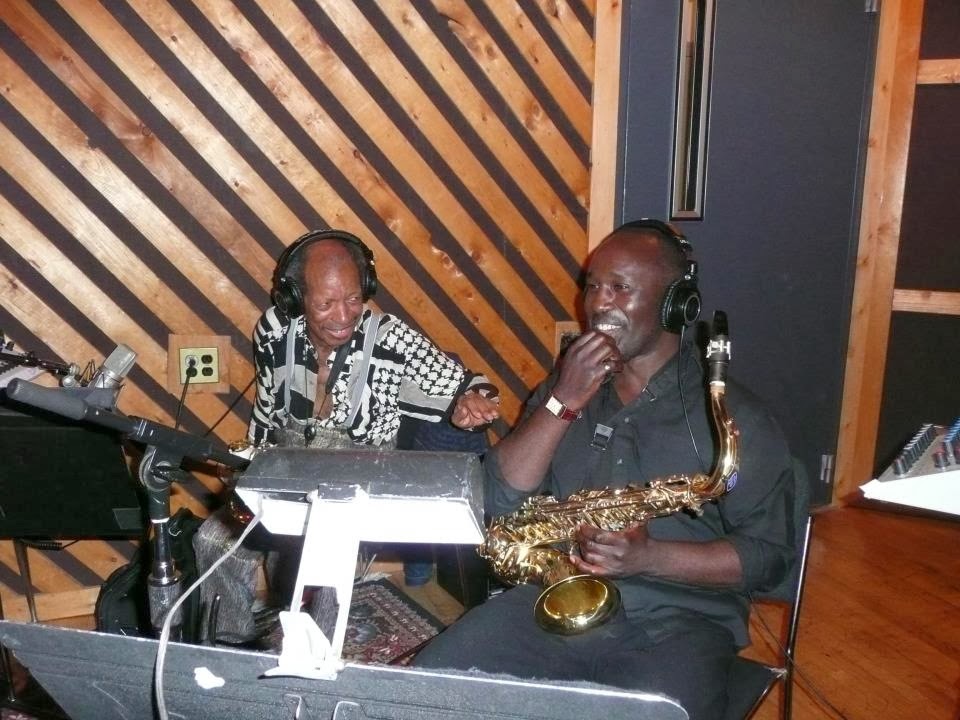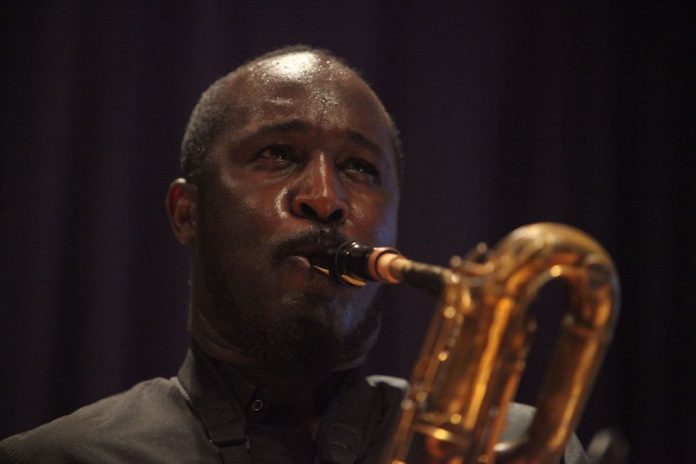Since he first appeared on the London scene with the Jazz Warriors in the early 1990s, Nottingham-born saxophonist Tony Kofi has risen to become as one of the finest and most-respected horn players in the country. His pronounced taste and versatility, fused with a uniquely soulful and passionate feel for the music, is what’s kept him in demand as a first-call session player, and his work as a recognised and respected leader just as active.
During a call to discuss his diverse career and his 2018 release Point Blank with stellar groove trio the Organisation, what soon becomes clear is the youthful 54-year-old’s deep knowledge and appreciation of the past, and all the important players that came before him and helped shape his style.
“I’m a product of the environment I grew up in”, Kofi boasts. “I come from a very traditional Ghanaian, West African background, so I‘m very influenced by that and have displayed this on some of my previous albums. But I also grew up listening to a lot of music. My parents didn’t play instruments, but they loved jazz and had a lot of records and because I listened to them as a kid it was like an osmosis, it just felt right to later learn and play stuff like Jimmy Smith’s Ready & Able and Ode To Billy Joe by Bobby Gentry.
“I would say my main influences musically though go back to the music my mum had – Duke Ellington, Count Basie, Louis Armstrong. I remember her playing all those amazing records, so that was probably the biggest influence for me, those big sounds. When I really got into music I began to buy a lot of vinyl myself. I discovered Charlie Parker, the alto became my first instrument and, along with Coltrane, Sonny Rollins and later Thelonious Monk, this music became the foundation of what I’m about today. It gave me a vision of how to approach the music”.
While Kofi’s approach, tone and technique are unique to what he is involved in musically, it’s not difficult to hear on Point Blank references to some of the swing that swayed him as a kid. The same can be said of the Organisation, a band which, since its first live outings in the early noughties, has developed a singular style and stamp of its own.
Seeing the band play at a packed club in deepest Dorking in 2014 was, for this writer, a definite highlight on the jazz calendar that year. Fronted by Kofi (who first played with the band in 2010) and featuring the present-day personnel of guitarist and founding member Simon Fernsby, organist Pete Whittakar and drummer Pete Cater, the group’s set that hot night opened with a heated reading of Mingus’s Flowers For A Lady that not only brought the house down but deftly displayed the group’s prowess at taking a old tune to a new level.
Disappointingly, the Mingus gem failed to find its way from the band’s live repertoire to Point Blank, but other tracks blown that night did, and rousing renditions of McCoy Tyner’s Search For Peace, Duke Pearson’s Minor League and Pat Martino’s Cisco swing hard alongside equally driving tracks by Dr. Lonnie Smith, Horace Silver, Henry Mancini and Wes Montgomery.
Pepper Adams: ‘He had full command of his instrument, but in a different way to say, Gerry Mulligan, who had a softer approach’
Point Blank received rave reviews from jazz rags and news dailies alike, and is alive with swirling organ lines, ballsy, bluesy baritone, breezy guitar and the sort of snappy stick and brush work you’d expect from Morello under Brubeck. The record also acts as a homage to many of the band’s favourite players and composers in Woody Shaw, McCoy Tyner and Wes Montgomery, not to mention baritonist Pepper Adams, whom Kofi confirms as the main reason he picked up the hefty horn in the first place.
“I was on tour in Japan, and on a day off went to Tower Records. I walked into the jazz department, and lo and behold I heard Donald Byrd’s Live At The Half Note. There was a track called Child’s Play and it just took hold of me. Pepper takes the first solo on that track, and I remember it sounding so urgent and so current. He had full command of his instrument, but in a different way to say, Gerry Mulligan, who had a softer approach. Once I found out it was Pepper playing I did some research and decided, once I got back to London, I was gonna get a baritone saxophone.
“In fact, the whole reason I ended up playing baritone in The Organisation was because I had a dodgy alto! Not yet a member of the group, I was asked by Simon to do a dep and I remember the alto just about made it through the first set! So I suggested to Simon I play the baritone and, at first, he wasn’t convinced it would work as a lead instrument. There were strange looks from the audience too as I walked out with it, but it did work, and I’ve stuck with it since. I’ve tried playing these tunes on alto and tenor but it doesn’t seem to work. Pete Cater is a sophisticated drummer with real drive, and anything lighter than the baritone now and the drums will eat you up. The organ sound really fills that bass space too, so I think the way The Organisation works suits that heavier sound from the sax. A more forceful, gravelly approach…”
Organising his time between The Organisation, various sessions, and the recording and promotion of a string of solo albums – Plays Monk (2004), Future Passed (2006) and The Silent Truth (2008) – Kofi has also found time over the last few years to share a studio and the bandstand with some supreme artists and bands (The World Saxophone Quartet, the Monk Liberation Band, Larry Bartley’s Trio, Gary Crosby’s “Nu-Troop”, Courtney Pine, Macy Gray, Donald Byrd, Julian Joseph, US-3, Harry Connick Jr and Abdullah Ibrahim to list just a few) but it was a chance to record with the late, great Ornette Coleman that he quietly appears most keen to be quizzed about. The pair are pictured below.

“In 2006 I was asked to dep with the World Saxophone Quartet and it turned out to be a permanent gig. In that band was [bassist] Jamaaladeen Tacuma, and we hit it off straight away. We did a lot of gigs with the quartet and also Jamaaladeen’s Coltrane Configurations project, which was us performing John Coltrane’s music in a kind of Prime Time way. It was really cool. and he asked me to front that band on alto and soprano. I did that gig for a few years and it took me all over Europe. Then after we did two live records Jamaaladeen told me he was planning a homage to Ornette.
“Ornette was Jamaaladeen’s mentor and he told me it was important he did this homage. He told me nothing was set yet but that he’d be in touch. He later called me in 2010 and told me it was gonna happen. We were gonna go in the studio with Ornette, Wolfgang Pusching on flute, Yoichi Uzeki on piano and drummer Justin Faulkner. I couldn’t believe it, but then he told me Ornette was gonna play alto so I would have to go on tenor! I had to tell him I’d never played tenor. I didn’t own one. So he said ‘Well, get one!’ Man, it was surreal. I had to borrow a tenor saxophone and throw myself into practising everyday for eight hours over those next few months.
‘Man, we rehearsed all day and Ornette’s energy was unbelievable. He didn’t wanna stop, and talked about music and harmolodics during the breaks’
“Luckily the session got moved from April to June which meant I had more time to practise. When the time came I went to New York and walked into this thing having not seen any music. Jamaaladeen always told me not to worry and that he’d send the music but to this day I’ve never seen the music! The first rehearsal was at Ornette’s house, this loft apartment, this big beautiful space with beautiful artwork. During that rehearsal I told myself I had to memorise this music because nobody had parts. Man, we rehearsed all day and Ornette’s energy was unbelievable. He didn’t wanna stop, and talked about music and harmolodics during the breaks. He just gave off this aura that he knew exactly what he was playing. I actually told him I wasn’t a tenor player and that I played alto and he told me not to worry and that I could transfer my ideas to any instrument. I remember being pretty inspired by that”.
The resulting recording, For The Love Of Ornette, was, at the request of Tacuma, taped in one take and stands as a superb document of Kofi and Coleman’s time together. It’s a set that also spotlights Kofi’s skills as an impeccable improviser able to adapt to any situation he’s thrown into. Try this example.
If you’re unfamiliar with Kofi’s playing and his music, maybe start by playing Point Blank to hear where he is at now. It’s a strong, groovy set missing only the heavy applause between the tunes you always hear at the guy’s gigs.
















